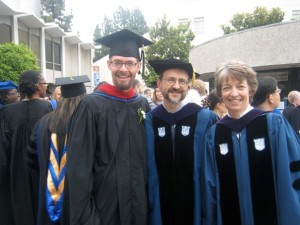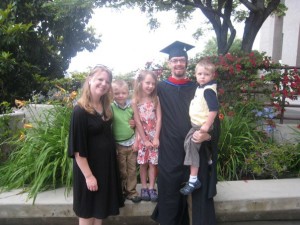(photo credit, John Thompson)
“He’s the toughest grader you will have at Fuller!”
These words did not ease my anxious spirit that January as I geared up for my return to MDiv studies after the birth of my firstborn, Mercy three months earlier. I almost lost my life after childbirth. Post-partum hemorrhaging and D.I.C. (or “Death Is Coming” as they call it) landed me in the ICU and after a miraculous recovery, the road back to post-partum strength and health had been difficult. Mercy was an “always hold me or I will cry” and “I will only sleep while being held” newborn which made the physical rest that my body so desperately needed a very real challenge. But my scholarship required degree completion in three years, so “taking a break” or “easing back in” or “going part time” were not options.
I carried those fears and physical realities with my books and notebook into John Thompson’s 8am “Reformation Theology” class that January morning fourteen years ago. I found a seat, settled my things, and felt the absence of the baby in my arms. Having set an alarm to wake at dawn to afford time to nurse Mercy, get dressed, pack the diaper bag for the day, hand her off to Doug and make the stop and go slog through morning traffic from South L.A. to Pasadena, I remember sitting wide-eyed that first morning waiting and watching and wondering if I was going to be able to succeed.
There is a lot of language around women and theological education and training, and as one who endured the sort of “your eyelashes are distracting when you preach” comments from male seminarians (not at Fuller!) which do such harm, I would argue that pregnancy, childbirth and motherhood were by far the steepest obstacles I encountered to successfully completing my seminary education. It all feels so profoundly fragile when I look back: like any number of things could have derailed me. Considering the challenges we faced during those years, I would have had every good reason to quit: to pause, to fade out, to fail, to never return. Dr. John Thompson, and Dr. Marianne Meye Thompson, are two of the reasons I didn’t.
That January morning, Dr. Thompson started the first day of class with a hymn. We sang loudly, intently, and it was both worship and consecration of the work we had gathered to do. He then led us in prayer. That pattern would continue-every 8am, every class began that way. The toughest grader at Fuller made sure we remembered and declared at the beginning of every class the source and purpose of what we had come to do, and who we were trusting for our success.
At 9:50am, Doug would arrive outside the classroom. Mercy would be encased in the Baby Bjorn, sleeping, usually covered in one of the swaddling blankets hand-sewn for us by a dear friend from my home church in Seattle. I could see them through that slit of a window in the classroom door, and I would watch Doug pace outside the classroom, rocking or bouncing a bit with a blanket-covered bulge on his chest, keeping the hungry baby asleep until those classroom doors would open and mom and her milk would return. He would hand her off and then head back to his office where Mercy had spent the last hour with him.
When I found out I was pregnant with Mercy, I was in a class with Marianne Meye Thompson studying the cross in the New Testament. Doug and I had not told anyone yet about the pregnancy when I hit that point in the first tri-mester where my extreme fatigue (falling asleep face-down on the living room floor at 7pm) and horrible nausea caught up to me. For the first time in my seminary career, this straight A student faced the prospect of not completing an assignment on time. I debated what to do because I hated seeing my pregnancy as a weakness. As a woman in seminary, I felt it was my duty to be able to do it all-to not let something tied to my gender be an excuse for any failure in my performance.
Something provoked me to talk to Dr. Meye Thompson about the assignment and I confided in her about my pregnancy, and stumbled over myself apologizing for its impact. She wasn’t hearing it. She beamed at me, drew a little closer, and said these words: “Being really sick early in the pregnancy is a very reassuring sign. It is a good sign that the pregnancy is secure and the baby is doing well.” There was such empathy, encouragement, understanding, and identification in her words, her tone, her posture. This fierce academic, this esteemed role model, this brilliant mind and teacher handed me much more than an extension on a paper that day. I was seen, I was accepted as I was, and my baby’s life was profoundly valued as part of mine in a way I had not realized I desperately needed.
“I will be hosting a weekly gathering in my office every Tuesday after class at 10am for any of you who wish to continue informal discussion on whatever topic we are addressing in class,” Dr. Thompson announced the second week. 10am. Post-baby-hand-off hour. Mercy’s nursing, burping, spitting up all over me and all of her clothing time. There is no way. Or is there…I wanted to be there. But I would be a distraction. She would be a distraction. What if she makes noise? Would my breastfeeding be offensive? Would our being there make someone uncomfortable?
I don’t remember how I decided to give it a shot but I did. After class that second week, I maneuvered my way down the walkway, down the stairs to the second floor, and into Dr. Thompson’s office. I settled myself and the diaper-bag backpack into a chair, cloaked my upper half in the swaddling blanket (we didn’t have those fancy nursing covers they make now!) and ducked my head underneath the blanket to settle and secure Mercy to my breast. I then resurfaced and settled in for a vibrant discussion of theology. Every week I would do this: I would breastfeed and burp my baby and engage in questions about atonement theory or Luther or Anselm and Abelard.
John welcomed us into that space. He welcomed both of us. He never made a spectacle out of us; he didn’t make a big deal about us being there; he never treated me, the nursing seminarian, as the aberration I so desperately feared being. But he also acknowledged my daughter and made sure there was space for me in the room. He never pretended she did not exist or cast an annoyed glance my way but instead offered a warm smile and kind comments on the few occasions she made noise. Those weekly discussion groups taught me something profound about myself and my calling: nursing a newborn did not require my mind to stop working, nor did it bar me from theological engagement with my peers. My vocation as a pastor and a theologian were not compromised by my vocation as a mother.
I earned a very high A in that theology class. And I completed my MDiv degree in the three-year timeline my scholarship required. During that time, I also helped to plant a church. I preached frequently. I co-labored in ministry with my husband. And I walked in my commencement ceremony with my seven-month old Mercy present in the cheering crowd and a surprise second baby in my belly.
I saw this week on Facebook that Dr. John Thompson was retiring from Fuller Seminary. I thank God for his life work as a professor, a scholar, and a friend to so many of us. His legacy is indeed a rich field of wildflowers, every size and color, pushing through every manner of soil and weather and season. Wildflowers he loves to find and notice. I am one of them.
I can’t find the photos from my graduation, so here is a pic taken at Doug’s Fuller commencement with Drs. John Thompson and Marianne Meye Thompson. And yes, I had another baby in my belly on that day as well. Her name is Hope.


